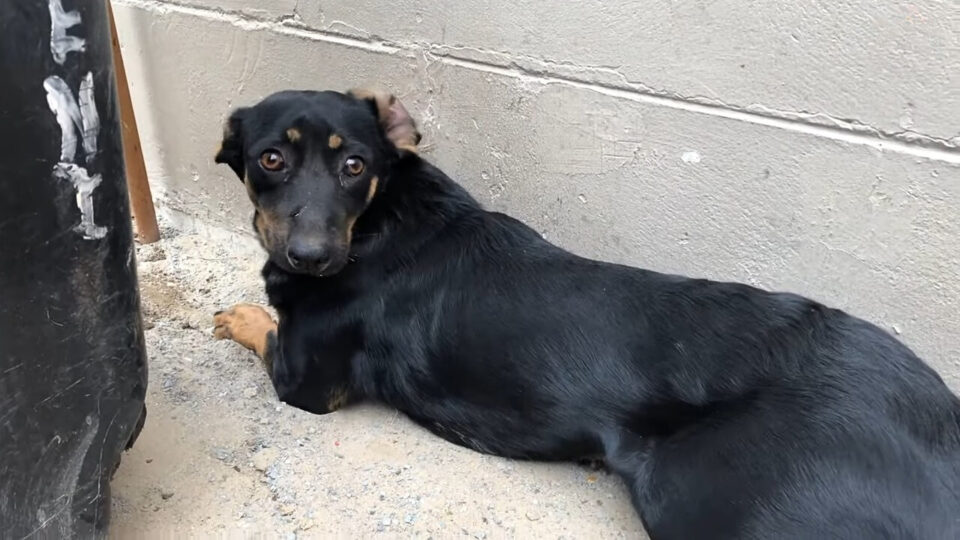Only love can mend a broken heart.
A pup named Dash desperately needed to feel human affection and encouragement after her owner kicked her out of her home.
With her feelings deeply hurt and nowhere to go, the pup was trying to survive on her own.
Sadly, the people whom she met chased her away. They refused to give the dog the kindness and help that she needed more than ever before.
Having experienced rejection and betrayal from humans, Dash started looking for places to hide from everyone.
The pup’s heart became overwhelmed with fear, and she started shaking uncontrollably.
Will anyone show her some compassion and heal her wounded heart?
The Pup Meets Her Rescuers

As soon as the rescuers at Sidewalk Specials were notified that there was a dog who badly needed their help, they headed to the location.
Upon their arrival, their hearts broke after they saw the terrified pup. She was lying on the ground, unable to stop trembling.
The good people approached her, and the pooch looked at them with the saddest eyes.
The rescue team found out that the canine’s owner didn’t want her anymore. They decided to take her into their care.
The kind-hearted people promised her that they would find her a new home where she would receive the love that she deserved.
One of the rescuers knelt down, took the pup into her arms, and gave her a big hug.

The pooch, later named Dash, still looked confused and frightened. She wasn’t aware that her life would finally turn for the better.
Rescuers took her straight to the vet and gave her her first bath.
Dash wasn’t used to receiving kindness and care from humans.
Healing At A Loving Foster Home

Her human friends found her a wonderful foster family who opened their hearts to Dash and welcomed her into their home.
Dash’s foster mom tried hard to win her trust and make friends with her.
Since the doggo was still frightened, she was always looking for places to hide. Her foster mom often found her cowering in corners.
She understood that the pup needed time to start trusting humans again. They failed her many times.
The kind woman built her a fort, and Dash started decompressing.

Thanks to the love and care her foster mom showered her with, the canine started letting go of her fears and feeling better.
Her eyes seemed more hopeful. Dash savored her foster mom’s cuddles, and she looked at her with gratitude and affection.
The sweet pup began believing that good people exist. Her heart glimmered with hope that she would soon find humans who would love her like she always wished for.

I hope that Dash will soon find forever parents who will spoil her with love and help her become a happy dog.
The pup’s story highlights the amazing work foster parents do. Day after day, they mend dogs’ broken hearts and prepare them for their forever homes.
From the bottom of my heart, thank you for all the love that you give to the abandoned and rejected canines.
If you’re a dog owner, you’re always looking for ways to keep your furry friend healthy and happy. One ingredient that has gained popularity in recent years is coconut oil. But is coconut oil good for dogs? In this article, we’ll explore the potential benefits of coconut oil for dogs and how you can incorporate it into their diet and grooming routine.
Coconut oil has been praised for its various health benefits in humans, from boosting immunity to improving skin and coat health. But can the same benefits be extended to our four-legged companions? Many dog owners swear by the positive effects of coconut oil, claiming that it can help with issues like dry skin, allergies, and even weight management. But before you start adding coconut oil to your dog’s food or applying it to their coat, it’s important to understand the science behind it and the proper way to use it. So, let’s dive into the world of coconut oil and its potential benefits for our furry friends.
Is Coconut Oil Good for Dogs?
Coconut oil has gained popularity not only for its benefits in humans but also for its potential benefits in dogs. As a dog owner, you may have wondered if coconut oil is safe and beneficial for your furry friend. Let’s explore the question: Is coconut oil good for dogs?
Benefits of Coconut Oil for Dogs
Coconut oil contains medium-chain triglycerides (MCTs), which are believed to offer several health benefits for dogs. Here are some potential benefits of coconut oil for dogs:
- Skin and Coat Health: Coconut oil can help improve the condition of your dog’s skin and coat. Its hydrating properties may help alleviate dryness, itchiness, and flakiness.
- Digestive Health: The MCTs in coconut oil are known for their antibacterial and antifungal properties, which may support a healthy digestive system in dogs.
- Weight Management: Adding coconut oil to your dog’s diet may help promote a healthy weight. The MCTs in the oil may help increase metabolism and provide a source of energy that can assist in weight maintenance.
- Immune System Boost: Coconut oil is praised for its immune-boosting properties in dogs. It may help strengthen your pet’s immune system and aid in fighting off infections and diseases.
How to Use Coconut Oil for Dogs
If you decide to incorporate coconut oil into your dog’s routine, it’s important to choose a high-quality, unrefined virgin coconut oil. Here are simple steps to follow:
- Start with a small amount (approximately a teaspoon) of coconut oil, depending on your dog’s size.
- Warm the oil between your hands to liquefy it.
- Gently massage the coconut oil into your dog’s coat, targeting dry or irritated areas.
- Allow the oil to absorb into your dog’s skin for several minutes before brushing or combing their coat to distribute the oil evenly.
- Repeat the process as needed, adjusting the amount of oil based on your dog’s needs and preferences.
Benefits of Coconut Oil for Dogs
Coconut oil, which is derived from the pressing of coconut meat, offers a multitude of benefits for your furry companion. As a dog owner, you’ll be delighted to discover the positive ways in which coconut oil can enhance your dog’s overall health and well-being. Here are a few amazing benefits of incorporating coconut oil into your dog’s routine:
1. Nourishes and Moisturizes Skin and Coat
Coconut oil works wonders in nourishing and moisturizing your dog’s skin and coat. Its natural properties help to alleviate dryness, itchiness, and flakiness, leaving your pup with a lustrous and healthy coat. Regular application of coconut oil can also help to minimize dandruff and promote a shiny and vibrant appearance. Additionally, coconut oil can provide relief from common skin irritations such as hot spots and eczema.
2. Supports Digestive Health
Coconut oil can be a valuable aid in supporting your dog’s digestive health. It contains medium-chain triglycerides (MCTs), which are quickly metabolized by the body and can assist in the absorption of nutrients. Including coconut oil in your dog’s diet may help with digestion, reducing gastrointestinal issues such as constipation and diarrhea. However, it’s essential to introduce coconut oil gradually into your dog’s diet to avoid any digestive upset.
3. Boosts Immune System
The antimicrobial properties of coconut oil can play a significant role in boosting your dog’s immune system. Coconut oil contains lauric acid, which has potent antibacterial, antiviral, and antifungal properties. By incorporating coconut oil into your dog’s diet or applying it topically, you can help strengthen their immune system and protect against common infections and diseases.
Incorporating coconut oil into your dog’s routine can yield amazing results in terms of skin and coat health, digestive well-being, and immune system support. It’s crucial to choose a high-quality, unrefined virgin coconut oil and introduce it gradually into your dog’s diet or apply it topically as recommended. Remember to consult with your veterinarian before making any significant changes to your dog’s diet or healthcare routine.
How to Use Coconut Oil for Dogs
Using coconut oil for dogs can provide numerous health benefits. However, it’s important to use it properly to maximize its effects and avoid any potential risks. Here are some important tips on how to use coconut oil for your furry friend:
- Choose high-quality coconut oil: Opt for unrefined virgin coconut oil, as it is the purest form and retains all the beneficial properties. Look for cold-pressed oil to ensure that no heat or chemicals were used during the extraction process.
- Introduce it gradually: When incorporating coconut oil into your dog’s diet, start with a small amount and gradually increase the dosage over time. This allows their digestive system to adjust and minimizes the chances of any gastrointestinal discomfort.
- Start with small portions: Begin with about ¼ teaspoon per day for small dogs and gradually increase the amount based on their size. Larger dogs may tolerate up to 1 teaspoon per day. However, it’s always best to consult with your veterinarian to determine the appropriate dosage for your specific dog.
- Incorporate it into meals: Mix the coconut oil into your dog’s regular food, ensuring it’s evenly distributed. This allows them to benefit from the oil’s healthy fats and other nutrients while enjoying their meal.
- Topical application: Coconut oil can be applied topically to your dog’s skin and coat. It can help moisturize dry skin, soothe irritations, and promote a healthy, shiny coat. Gently massage a small amount onto their skin, focusing on dry or irritated areas.
Remember, while coconut oil offers many benefits for dogs, it should be used in moderation. Excessive consumption of coconut oil can lead to weight gain and other health issues. Always consult with your veterinarian before making any significant changes to your dog’s diet or healthcare routine.
By following these guidelines, you can safely and effectively incorporate coconut oil into your dog’s routine and help support their overall health and well-being.
Are There Any Risks Giving Your Dog Coconut Oil?
While coconut oil can offer numerous benefits for dogs, it’s important to talk about the potential risks associated with its use. Here are some considerations to keep in mind:
- Digestive Issues: Coconut oil can be hard on a dog’s stomach, especially if given in large quantities. The most common side effect is oily diarrhea, which can indicate an excessive amount of coconut oil in their diet. If you notice any problems with your dog’s stools, it may be best to discontinue the use of coconut oil or significantly reduce the amount given.
- Lack of Research: It’s important to note that there is limited research on the effects of coconut oil specifically in dogs. While many claims are based on anecdotal evidence or studies conducted on humans or rodents, it’s essential to approach the use of coconut oil in dogs with caution.
- Allergies and Sensitivities: Just like humans, dogs can also have allergies or sensitivities to certain substances, including coconut oil. While true allergies to coconut oil are rare, some dogs may still exhibit adverse reactions. It’s always a good idea to monitor your dog closely when introducing any new supplement or ingredient into their diet.
- Weight Gain: Coconut oil is high in saturated fat and calories. If given in excess or without moderation, it can contribute to weight gain in dogs. This can be especially problematic for dogs who are already prone to weight issues or obesity. Always consult with your veterinarian to determine the appropriate dosage and ensure that your dog’s overall diet is well-balanced.
- Consult with Your Veterinarian: It cannot be stressed enough how valuable it is to consult with your veterinarian before introducing coconut oil or making any significant changes to your dog’s diet. They can provide expert advice tailored to your dog’s specific needs and help you determine if coconut oil is a suitable addition to their health regimen.
By being aware of these potential risks and consulting with your veterinarian, you can ensure that you are using coconut oil in a way that maximizes its benefits while minimizing any potential harm.
Conclusion
Coconut oil can be a beneficial addition to your dog’s diet and skincare routine when used properly. By choosing a high-quality, unrefined virgin coconut oil and introducing it gradually, you can maximize its benefits while minimizing potential risks. Starting with small portions and consulting with a veterinarian will help determine the appropriate dosage for your dog.
Applying coconut oil topically can also help moisturize your dog’s skin and coat. However, it’s important to remember that moderation is key. Too much coconut oil can lead to digestive issues and potential weight gain.
While coconut oil has many potential benefits for dogs, it’s essential to consult with a veterinarian before making any significant changes to your dog’s diet or healthcare routine. Every dog is unique, and a professional can provide personalized advice based on your dog’s specific needs.
Coconut oil can be a valuable addition to your dog’s life, but it’s crucial to use it in moderation and seek professional guidance. With the right approach, coconut oil can contribute to your dog’s overall well-being.
What are the benefits of using coconut oil for dogs?
Coconut oil can aid in digestion, improve brain energy and mental function, reduce coughing, eliminate hairballs, and promote good health when added to the dog’s diet or applied topically.
What is the healthiest oil for dogs?
Fish oil, coconut oil, flaxseed oil, olive oil, and sunflower oil are all considered healthy options for dogs.
Can coconut oil help with dog yeast infections?
Yes, coconut oil contains antibacterial properties that can help fight against yeast infections in dogs. It can be added to their diet or applied directly to the affected area.
Does coconut oil have antifungal properties?
Yes, coconut oil has established antifungal properties and has been found to be effective against certain yeast species.
What are some recommended coconut oil brands for dogs?
NOW Solutions Liquid Coconut Oil, Raw Paws Organic Virgin Coconut Oil, and Zesty Paws Coconut Flavored Liquid Skin & Coat Supplement are all highly recommended coconut oil brands for dogs.
[no_toc]

Hey there, I’m Janet Brooks, a dog-loving student from California. I’m all about helping pups in need, especially those without homes. Me and my awesome friends work together to give shelter and love to stray dogs. Oh, and I also write blogs about dogs to share helpful info.